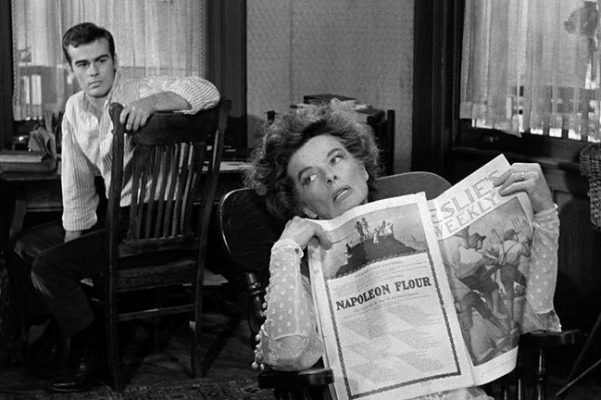Eugene O’Neill’s final play was (according to his wishes) supposed to be held back from publication for twenty-five years. His widow had other ideas but the overtly personal nature of the work makes his reticence understandable. The Tyrone family tear and claw at each other in their Connecticut Monte-Cristo Cottage, seemingly dredging up every failure and trauma in their shared lives over the course of a single day in 1912.
This adaptation is centred upon a family on the cusp of implosion being steered into emotional oblivion by a failing patriarch. Ralph Richardson captures the faded thesping of James Tyrone, but also outlines his curious relationship with money and neglect of his families emotional well-being. A dishevelled but utterly convincing Katherine Hepburn plays his wife Mary, who is given the bulk of the showy monologues and allowed to really delve into the emotional fragility of the character.
Jason Robards won awards on Broadway and effortlessly converts that performance onto the screen, with perfectly timed fury as the bitter but self-aware drunken older brother Jamie. Dean Stockwell is essentially playing a young O’Neill, the younger brother with the chronic condition, casting a shadow over proceedings in the third and fourth acts.
Eugene O’Neill’s autobiographical four act play was, by his own admission, written in ‘tears and blood’. The tumult of such a creative process could have created an overtly personal and self-absorbed depiction of a disfunctional middle class brood. Fortunately director Sidney Lumet understands that in order to make the arguments accessible the audience must be given access to more than the dialogue. He circles his camera to convey states of mind, and uses the architecture of the cottage to physically block the actors.
Lumet’s clever staging dulls the repetitive nature of the play and the circular arguments. Whilst these are fairly authentic depictions of substance and behavioural problems, they can outstay their welcome. Lumet’s film succeeds because of his subtle direction, whilst the other adaptations fall victim to an extreme reverence and lack of star power.
Hepburn is the undoubted star and she takes centre-stage with a captivating and layered core performance. Robards burst of drunken honesty surfaces in the fourth act, but he is outshone by the sheer variety in Hepburn’s performance. Her morphine-induced reminiscing about her pivotal decisions in life; wanting to become a nun and meeting James, convey a searing emotional honesty. Her confession to her Irish maid through a dope-haze is compelling and physically impressive, as she flails around from chair to floor, whilst the bewildered girl looks on with a mixture of awe and confusion.
Available on Blu-ray from Mon 16 Mar 2020
